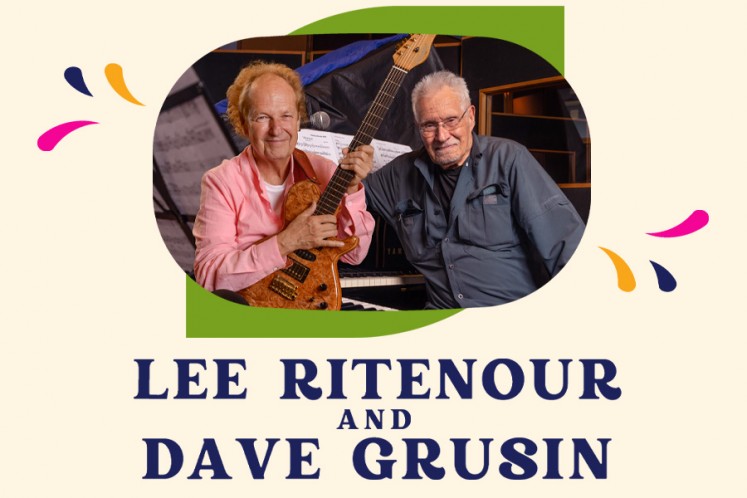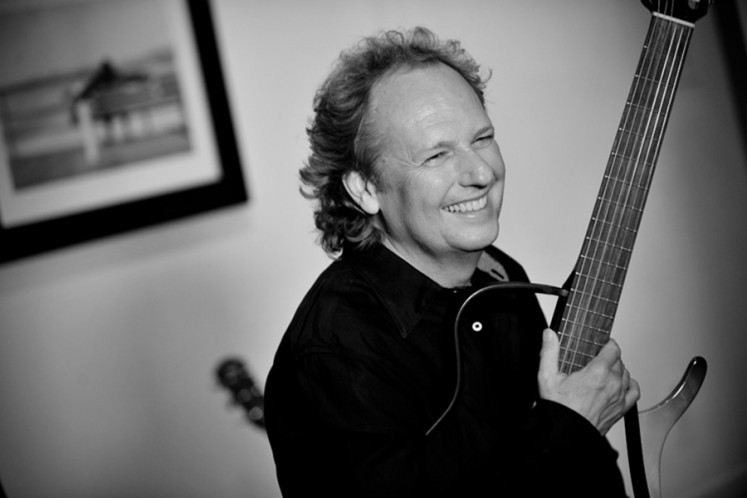SOLD OUT ~ Lee Ritenour & Dave Grusin
For Lee Ritenour, love for the guitar began when he was 8. By 12, he was serious about playing and his father, an amateur piano player, found him some of the best teachers around. It was the mid-60s, and everybody’s number was in the phone book. “My dad, who was always very supportive, called up Joe Pass and Barney Kessel and asked them to give me guitar lessons,” he said. “Barney ended up recommending this incredible teacher, Duke Miller, and that was the foundation of all my playing. The Lighthouse in L.A. was a very funky jazz club where I met Wes Montgomery. By the age of 16, I’d take the car over there in the late afternoon and just watch the bands' soundchecks.”
The guitar scene at the time was a master class for the young musician. “In every field, there were legends,” he said. “In jazz, you had Joe Pass, Wes Montgomery, Barney Kessel, Howard Roberts, Jim Hall, and Pat Martino. In blues there was B.B. King, Albert King, John Lee Hooker. In rock, Jimi Hendrix was coming, Clapton and Beck were already there. In country, you had Chet Atkins and then the all-time great classical masters Segovia and Sabicas and flamenco master Paco de Lucia. Great guitar playing was everywhere you turned and I loved them all. How could you not?”
Those eclectic early tastes served Ritenour well. From the day he lucked into his first session for The Mamas and the Papas at 16, he had the widescreen mentality to forge a career as one of L.A.’s busiest session men. “I remember John Phillips had this incredible studio in his Beverly Hills mansion and I thought, ‘This is what I want,” he said. “I remember getting called by Bob Ezrin to work on Pink Floyd’s The Wall. Incredible! Too many memories!”
In 1976, Ritenour launched a solo career and managed to follow his muse while finding commercial success, especially in the 1980s. “On the West Coast, fusion was just starting,” he said. “We were beginning to combine the melodies of pop music with the sophistication of jazz. It was really a natural evolution for my own records to evolve out of that. When I finally did win a Grammy in 1985 for “Early A.M. Attitude,” I think I was actually stuck on the freeway, but awards aren’t the reason we’re making music.”
For Ritenour, those early days were only the beginning of a dazzling five-decade career that has seen him as an enfant terrible of ‘70s fusion, a crossover star of the ‘80s pop chart, an honorary exponent of Brazilian jazz, and the fingers behind the ‘90s supergroup, Fourplay. He’s a Grammy Award winner with 16 nominations and a Jazz Society honoree. You’d think he’d be content to rest on his laurels.
You’d be wrong.
“People have been telling me for years, ‘You gotta make a solo guitar record,” he said. “In the past, I’ve always been the band guy, the ensemble guy, so this was one project I hadn’t done. I knew it was time.” The result was 2020’s Dreamcatcher, an album that reflects a difficult time in Ritenour’s life. “Our house and my studio in Malibu burned down in 2018,” he said. “About 100 of my guitars, amps, lots of music and the history of my career went up in smoke, pretty much. A week after the fire, I went to the hospital, which I’d never had to do before, for surgery to replace an aortic valve. Those incidents and the support of friends and family absolutely went into this music. Making this record was a lifesaver for me.”
Then, of course, COVID and lockdown hit. Ritenour settled into the makeshift studio in his new home, equipped with only seven guitars, a computer interface, and good intentions. He let the context flood into the music he was making. “It was an important album for me, especially with everything going on in the world,” he said.
Collaboration might be a constant in Lee Ritenour’s life, but in a career of left turns, Dreamcatcher is another detour for him. Both by necessity and design, this album represents music in its purest form: one man channeling his headspace and the history unfolding around him, using the instrument that has sustained him all these years. “I’ve never done anything like this before and it’s an important missing piece in my guitar history,” he said. “It was inspiring and meant to happen in these times. After a lifetime of playing the guitar, this project reaffirmed just how much I love the guitar.”
Dave Grusin has worked in the profession of music since the late 50’s, variously as an arranger, pianist, composer & record producer. Born in Littleton, CO and educated at the University of
Colorado, he holds honorary doctoral degrees from CU, the Berklee College of Music in Boston, and the Manhattan School of music.
Considered one of the top 10 film scorers of his generation, Grusin is also renowned as a jazz artist and co-founder of the independent record label GRP. Early fusion jazz albums include “Mountain Dance”, “Harlequin”, and “Migration”, and a deep immersion in digital technology. In the 1990’s he returned to a focus on the acoustic piano, which led to four critically
acclaimed tribute albums of Gershwin, Ellington, Mancini, and Bernstein material.
From 1976 to 1995, he was in partnership with Larry Rosen as owners of GRP records. His life as a recording artist and producer has resulted in ten Grammy awards and numerous nominations,
(including one for “Two Worlds” in 2002, and another for “Amparo” in 2008.) These two classical projects with guitarist Lee Ritenour feature performances by Renee Fleming, Joshua Bell, Gil Shaham, Chris Botti and James Taylor, among others.
He has written over sixty film scores, including The Graduate, Tootsie, The Fabulous Baker Boys, The Firm, Havana, Heaven Can Wait, and On Golden Pond.. Having received 8 Academy Award
nominations, he won an Oscar in 1988 for The Milagro Bean Field War, featuring guitarist Angel Romero. Most recently he scored Recount for HBO.
He has also arranged for and/or performed with: Quincy Jones, Gerry Mulligan, Antonio Carlos Jobim, Arnold Steinhardt, Bobby Macferrin, Peggy Lee, Patti Austin, Diana Kral, Grover Washington Jr., Earl Klugh, Arturo Sandoval, Clark Terry, Sergio Mendes, James
Taylor, Billy Joel, Andy Williams, Paul Simon, etc.
Most recently, he is the subject of a music documentary film, “Dave Grusin, Not Enough Time”, produced and directed by Barbara Bentree & John Rangel.
In addition to his profession, Dave is co-founder (with Rosen) of the National Foundation for Jazz Education, a philanthropic group dedicated to helping young jazz musicians. He is also a cattle
rancher and a dedicated environmental activist.




